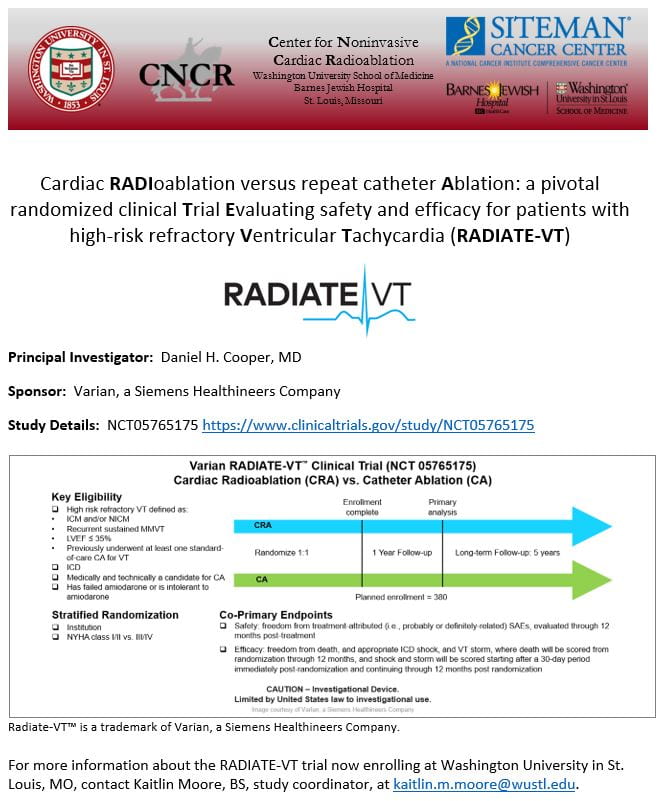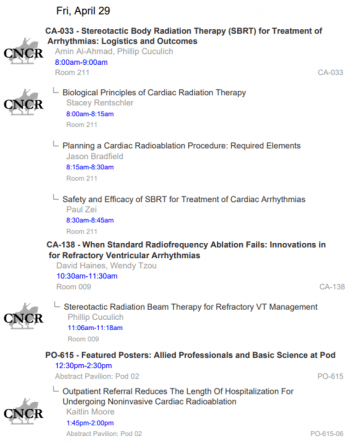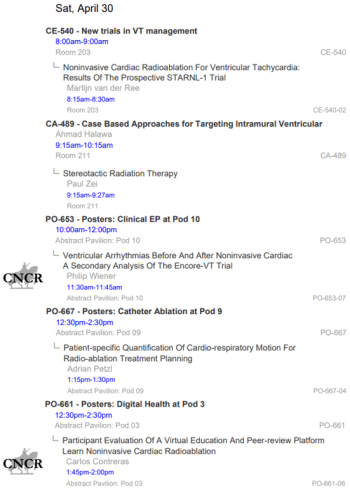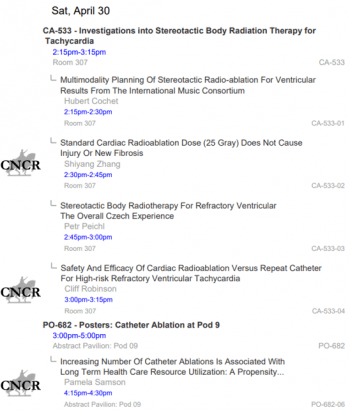News from Our Center
May 13, 2024
The CNCR team will be attending HRS 2024 this year in Boston, MA. There are several presentations at HRS this year about cardiac radiotherapy, not only from Washington University, but from many other centers as well.
We have compiled a list of all presentations at HRS about cardiac radiotherapy. We look forward to seeing everyone there to discuss and continue to learn about this important topic in EP and Radiation Oncology.









July 28, 2023
Washington University is now enrolling in the RADIATE-VT trial evaluating repeat catheter ablation vs cardiac radioablation in patients with ventricular tachycardia.
For details, please visit clinicaltrials.gov. For patient referrals, please contact Kaitlin Moore at kaitlin.m.moore@wustl.edu.

May 17, 2023
The CNCR team will be attending HRS 2023 this year in New Orleans, LA. There are numerous presentations at HRS this year, not only from Washington University, but from many other centers as well.
We have compiled a list of all presentations at HRS about cardiac radiotherapy. We look forward to seeing everyone there to discuss and continue to learn about this important topic in EP and Radiation Oncology.






April 21, 2023
Washington University is now open to enrollment for the Cardiac RADIoablation versus repeat catheter Ablation: a pivotal randomized clinical Trial Evaluating safety and efficacy for patients with high-risk refractory Ventricular Tachycardia (RADIATE-VT) sponsored by Varian Medical Systems. For more information about this trial, please visit clinicaltrials.gov.
April 27, 2022
The CNCR team will be attending HRS 2022 this year in San Francisco, California and many abstracts submitted by CNCR have been accepted.
Cardiac radioablation is a growing topic of conversation in the EP and radiation oncology fields and, therefore, many presentations at HRS this year will be centered around this topic. We look forward to seeing everyone there and the conversation around this very important, emerging field.



September 24, 2021
New data indicates “Cardiac radiotherapy induces electrical conduction reprogramming in the absence of transmural fibrosis“. These findings were recently published by our team in Nature Communications.
For more discussion on this manuscript, stop by Dr. Phillip Cuculich’s Twitter thread.
September 01, 2021
In the September edition of the Red Journal podcast, editor-in-chief Anthony Zietman gives praise to the Method and Atlas to Enable Targeting for Cardiac Radioablation Employing the American Heart Association Segmented Model manuscript from Brownstein, et al.
August 23, 2021
Our team has been invited to give presentations at the 16th International Symposium on Ventricular Arrhythmias: Pathophysiology and Therapy, co-hosted by Hospital of University of Pennsylvania and The Mount Sinai Hospital and co-sponsored by Heart Rhythm Society on October 15-16, 2021. These presentations include:
- Friday, October 15, 2021
- Session I: Biology/Biophysics of Old and New Ablation Strategies
8:16AM – 8:25AM EDT
“Effects of Focused Radioablation on Basic Electrophysiology: Functional Ablation?”
Presented by Stacey Rentschler
- Session I: Biology/Biophysics of Old and New Ablation Strategies
- Saturday, October 16, 2021
- Session XIII: Bailouts for Failed Ablation Procedures and Future Directions to Improve Outcomes – Part 1
3:09PM – 3:18PM EDT
“Radioablation: Patient Selection, Targets, Outcome”
Presented by Phillip Cuculich
- Session XIII: Bailouts for Failed Ablation Procedures and Future Directions to Improve Outcomes – Part 1
For more information on this conference, please visit the VT Symposium site.
May 26, 2021
Press Release from Varian – Varian Receives FDA “Breakthrough Device Designation” for its Cardiac Radioablation (CRA) System for Treatment of Refractory Ventricular Tachycardia
In the Media
AARP The Magazine: Radiation therapy to reprogram deadly heart arrhythmias
Associated Press: Putting radiation to the test to heal irregular heartbeat
Medscape: Radiation Ablation of VT: Dramatic Results in Small Series
Medscape: ENCORE-VT Takes Noninvasive VT Ablation to Next Level
Medscape: VT Reduced With Single Radiation Treatment
Medscape: Catheter-Free Radiation Ablation of VT Still ‘Safe, Effective’ at Late Follow-up
The New York Times: A ‘Game Changer’ for Patients With Irregular Heart Rhythm
Physics World: Radiation can reverse heart rhythm disorders by reprogramming damaged cardiac cells
Washington University in St. Louis: Deadly heart rhythm halted by noninvasive radiation therapy
Washington University in St. Louis: Radiation therapy effective against deadly heart rhythm